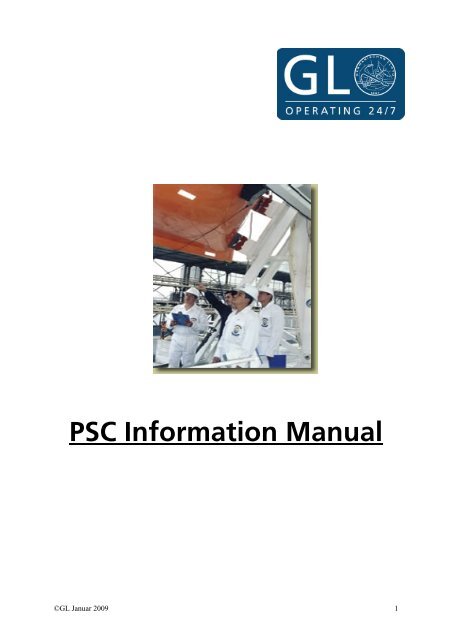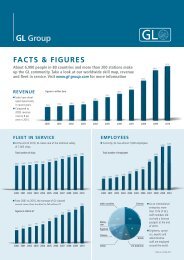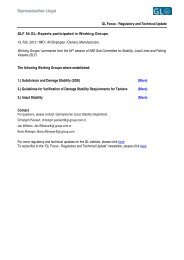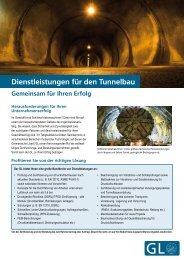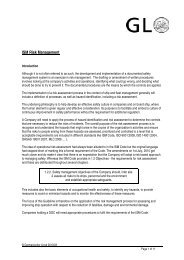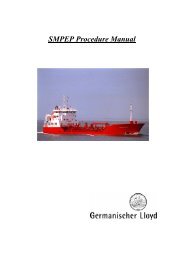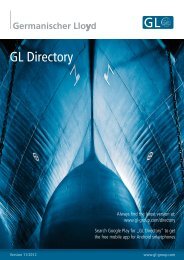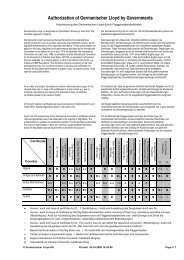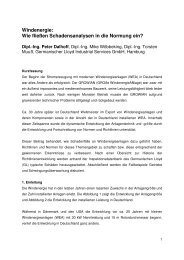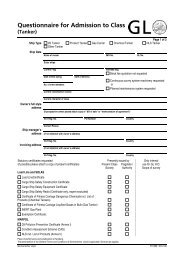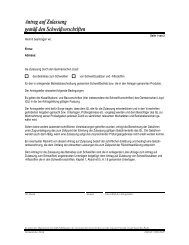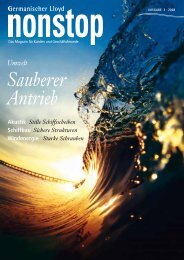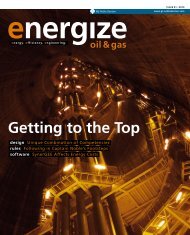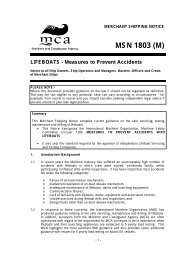PSC Information Manual - GL Group
PSC Information Manual - GL Group
PSC Information Manual - GL Group
Create successful ePaper yourself
Turn your PDF publications into a flip-book with our unique Google optimized e-Paper software.
<strong>PSC</strong> <strong>Information</strong> <strong>Manual</strong><br />
©<strong>GL</strong> Januar 2009 1
Background<br />
Aims of <strong>PSC</strong>:<br />
All countries have the right to inspect ships of foreign flags visiting their ports to ensure that they meet IMO<br />
requirements regarding safety and marine pollution prevention standards. Thus Port State Control is intended as<br />
a tool for any country to<br />
control safety standards, safeguard the own territory against hazards to safety and the environment and<br />
keep substandard ships off their coast.<br />
Since 1982 various countries have agreed within certain areas in the world to co-operate with <strong>PSC</strong><br />
and have signed an agreement called "MEMORANDUM OF UNDERSTANDING ON PORT STATE CONTROL"<br />
The agreement establishes rules for<br />
training of the inspectors,<br />
inspections on a common scope, amount of inspections per year<br />
general agreements on clear grounds for detaining a ship,<br />
a database system for exchanging information about inspected ships<br />
Legal Background:<br />
The right to inspect ships by port states is laid down in following Conventions:<br />
SOLAS Convention 74/78<br />
MARPOL Convention 73/78<br />
Loadline Convention 1966<br />
STCW Convention 1995<br />
Collision Prevention Regulations 1972<br />
International Tonnage Convention 1969<br />
Antifouling System Convention (AFS 2001)<br />
ILO Convention Nr. 147 (crew accommodation)<br />
©<strong>GL</strong> Januar 2009 2
<strong>PSC</strong> Regional Agreements<br />
Agreement Areas with their members:<br />
PARIS MOU:<br />
Belgium, Bulgaria, Canada, Croatia, Cyprus, Denmark, Estonia, Finland, France, Germany, Greece, Great<br />
Britain, Ireland, Iceland, Italy, Latvia, Lithuania, Malta, Netherlands, Norway, Poland, Portugal, Romania, Russian<br />
Federation, Slovenia, Sweden, Spain<br />
TOKYO MOU:<br />
Australia, Canada, Chile, China, Fidschi, Indonesia, Japan, Republic of Korea, Malaysia, New Zealand, Papua<br />
New Guinea, Philippines, Russian Federation, Salomon Islands, Singapore, Thailand, Vanuatu, Vietnam,<br />
Hongkong (China)<br />
VIÑA DEL MAR MOU:<br />
Argentine, Brazil, Chile, Cuba, Ecuador, Colombia, Mexico, Panama, Peru, Uruguay, Venezuela<br />
CARIBBEAN MOU:<br />
Anguilla, Antigua and Barbuda, Aruba, Bahamas, Barbados, Bermudas, British Virgin Islands, Cayman Islands,<br />
Dominica, Grenada, Guayana, Jamaica, Monserrat, Netherlands Antilles, Saint Kitts & Nevis, Saint Lucia, St.<br />
Vincent and the Grenadines, Suriname, Trinidad & Tobago, Turks and Caicos Islands<br />
MEDITERRANEAN MOU:<br />
Algeria, Cyprus, Egypt, Israel, Libanon, Malta, Morocco, Tunesia, Turkey, Palestine Authority<br />
INDIAN OCEAN MOU:<br />
Australia, Eritrea, India, Iran, Kenia, Maldive Islands, Mauritius, Oman, South Africa, Sri Lanka, Sudan, Tanzania,<br />
Yemen<br />
ABUJA MOU:<br />
Benin, Cape Verde, Congo, Cote d'Ivoire, Gabon, Gambia, Ghana, Guinea, Liberia, Mauretania, Namibia,<br />
Nigeria, Senegal, Sierra Leone, South Africa, Togo<br />
BLACK SEA MOU:<br />
Bulgaria, Georgia, Romania, Russian Federation, Turkey, Ukraine.<br />
RIAD MOU: (still under construction)<br />
©<strong>GL</strong> Januar 2009 3
<strong>PSC</strong> Procedure<br />
Boarding Procedures<br />
<strong>PSC</strong> Inspectors are boarding a ship without announcement and primarily check the ship's documents for<br />
completeness and validity.<br />
If there are any grounds to believe that the ship is substantially not conforming with the international conventions,<br />
the inspector will carry out an expanded inspection of the ship's condition and the required equipment.<br />
The Master will receive an official inspection report consisting of Form A and B. Form A lists the ship's details and<br />
the validity of the relevant certificates. Form B shows the list of deficiencies found (if any), with an action code<br />
which describes a timeframe for rectification for each deficiency.<br />
If clear grounds are established that the ship forms a hazard to safety and/or the environment, the <strong>PSC</strong>O has the<br />
right to detain the ship in port until the respective deficiencies have been rectified and resurveyed. The <strong>PSC</strong><br />
authority will either resurvey by own inspectors or ask for a survey report from the Classification surveyor to verify<br />
the rectification.<br />
In case of a detention the <strong>PSC</strong> authority has the right to present a bill about their inspection activities. Any<br />
detention has to be reported as soon as possible by the authority to the flagstate, the classification society and<br />
IMO.<br />
The data about the inspection and the given timeframe for rectification are entered in a computer system used by<br />
all members of a regional <strong>PSC</strong> agreement.<br />
Deficiency Codes<br />
The <strong>PSC</strong> authorities within the main MOU regions are using deficiency codes for the various defects they are<br />
listing in the inspection reports. They are defining the kind of deficiency and are used for statistical evaluations.<br />
The complete list of the deficiency codes used by <strong>PSC</strong> in the reports is to be found in the Annex of this manual.<br />
The deficiency codes may slightly vary between the MOU areas<br />
Action Codes<br />
The given timeframe for rectification of each deficiency is commonly given in a coded form in the inspection<br />
report, called "action code".<br />
Following codes are mainly used:<br />
30 = Grounds for detention<br />
17 = Master instructed to rectify deficiency before departure<br />
16 = to be rectified within 14 days<br />
15 = to be rectified at next port of call<br />
19 = rectify major non-conformity before departure<br />
18 = rectify non-conformity within 3 months<br />
10 = deficiency rectified<br />
40 = next port informed<br />
47 = as in agreed class conditions<br />
50 = Flagstate/consul informed<br />
70 = Classification society informed<br />
80 = temporary repair<br />
99 = to be specified in free text<br />
.<br />
©<strong>GL</strong> Januar 2009 4
Inspection Campaigns<br />
The regional <strong>PSC</strong> MOU members from time to time agree to carry out special inspection campaigns for a period<br />
of generally 3 months.<br />
Within such campaigns special attention will be laid on certain details during the regular inspections held<br />
onboard.<br />
Following campaigns have been carried out in the past:<br />
Inspection of the GMDSS equipment and the use by operators<br />
Inspection of safety on passenger ships<br />
Inspection of ISPS Code compliance<br />
Inspection of MARPOL Annex I requirements<br />
Inspection of navigational equipment<br />
Further campaigns will be announced in advance in the publications of the <strong>PSC</strong> MOU offices. <strong>GL</strong> will publish<br />
these campaigns in our news letters and on the webpage where this manual is found.<br />
<strong>PSC</strong> in regard to ISM:<br />
Common rules are being established in accordance with IMO guidelines how to inspect the presence of an ISM<br />
system onboard.<br />
In the IMO Circular MEPC/Circ.354 dated 18.12.1998 following Interim Guidelines are laid down:<br />
• The inspector will not carry out an audit. He will primarily conduct an inspection of the relevant ISM<br />
certification.<br />
• A more detailed inspection of the SMS will be carried out if clear grounds are established which may<br />
include absence or inaccuracy of the ISM Code Certification or detainable or many non-detainable<br />
deficiencies in other areas.<br />
• Within a more detailed inspection the inspector may utilize a catalogue of 11 questions to verify the extent<br />
of compliance with the ISM Code.<br />
If deficiencies are found by the inspector, <strong>PSC</strong> expects actions to be taken by the owners to carry out corrective<br />
actions in conjunction with the ISM certifying society.<br />
©<strong>GL</strong> Januar 2009 5
Special Banning Rules within PARIS MOU:<br />
PARIS MOU in conjunction with the EC has published regulation valid since 2003-07-01 about banning of ships<br />
from EC waters:<br />
On the basis of EC Directive 2001/106/EC any oil tanker, product carrier, bulk carrier, and passenger ship will be<br />
banned which<br />
• flies a flag of “very high risk” acc. to the MOU Black List and has been detained twice within three years or<br />
• flies a flag of “medium risk” acc. to the MOU Black List and has been detained 3 times within 2 years<br />
Detentions from 2002-01-22 will count towards a ban.<br />
The ban will only be lifted after official statements from class and flag that the ship complies in full and a thorough<br />
inspection by <strong>PSC</strong>.<br />
Special rules for Expanded Inspections within PARIS MOU:<br />
Since July 2003 following ships are subject of an annual expanded inspection when visited:<br />
Oil tankers over 15 years of age and 3000GRT,<br />
chemical and gas carrier over 10 years,<br />
bulk carriers over 15 years and passenger ships over 15 years<br />
Masters have to report to <strong>PSC</strong> in advance if the next inspection is due again. Further details can be found in the<br />
PARIS MOU Internet pages (“MEI <strong>Information</strong>”).<br />
©<strong>GL</strong> Januar 2009 6
Prevention<br />
Preventive Actions:<br />
In order to avoid problems with Port State Control inspections owners should care for that their ships are properly<br />
maintained and all international requirements are fulfilled onboard. Following points should be observed:<br />
continuous maintenance onboard<br />
Critical Areas:<br />
regular training of the crew for emergency situations<br />
regular check of the certificates' validity and due surveys<br />
cleanliness on deck (first impression!)<br />
access control onboard<br />
correct and polite cooperation with the <strong>PSC</strong> official, accompany <strong>PSC</strong>O to clarify questions on the spot,<br />
open locked doors etc.<br />
The statistics on the deficiencies found by <strong>PSC</strong> show that the majority of the deficiencies is found in the<br />
area of the Safety and MARPOL Equipment.<br />
Further information can be obtained in our brochure “The Top Ten <strong>PSC</strong> Findings” on the <strong>GL</strong> webpage<br />
where this manual is found.<br />
©<strong>GL</strong> Januar 2009 7
<strong>GL</strong> Involvement:<br />
<strong>GL</strong> may assist ships in port in view of surveying the rectification of deficiencies, if requested by the owners.<br />
<strong>GL</strong> is assessing each <strong>PSC</strong> detention report in view of checking the quality of the own survey activities regularly<br />
conducted onboard. An analysis of each deficiency listed is conducted in view of tracing any fault made by <strong>GL</strong><br />
staff. Corrective actions are taken if such faults have been found.<br />
All deficiencies listed in the reports are entered in our <strong>PSC</strong> Assessment Database and statistics as for the kinds<br />
of deficiencies are drawn from the system in order to find out which areas onboard are frequently found deficient.<br />
Thus the statistical data will be used for improvement of the quality of our services. Furthermore <strong>GL</strong> has to report<br />
to the flag states about the assessment of each <strong>PSC</strong> detention case.<br />
Services<br />
Assistance by <strong>GL</strong>:<br />
Assistance can be given to ship owners by <strong>GL</strong> on request.<br />
Local surveyors may discuss with <strong>PSC</strong> officials about the correctness of deficiencies in dispute.<br />
However it has to be pointed out that the final decision in any case is resting entirely with the Port State Control<br />
Authority!<br />
Assistance further can be given by <strong>GL</strong> in cases of detentions by reporting the rectification of deficiencies to the<br />
<strong>PSC</strong> authorities in order to speed up detention lifting.<br />
Checklists:<br />
In order to assist ship owners <strong>GL</strong> has issued a Maintenance Checklist for controlling the conditions of ship and<br />
equipment in order to avoid problems with <strong>PSC</strong> inspections.<br />
Furthermore <strong>GL</strong> published a booklet “The Top Ten <strong>PSC</strong> Findings” showing the deficiencies mainly found by <strong>PSC</strong><br />
on <strong>GL</strong> classed ships during the last two years.<br />
Both documents can be downloaded from the <strong>GL</strong> webpage where this manual is found.<br />
Annex:<br />
<strong>PSC</strong> deficiency codes<br />
©<strong>GL</strong> Januar 2009 8
Edition 01/2009<br />
Deficiency Code Deficiency Description<br />
0100 SHIP'S CERTIFICATES AND DOCUMENTS (SOLAS, LL, MARPOL)<br />
0110 Cargo Ship Safety Equipment (including exemption)<br />
0111 Cargo Ship Safety Construction (including exemption)<br />
0112 Passenger Ship Safety (including exemption)<br />
0113 Cargo Ship Safety Radio (including exemption)<br />
0114 Cargo Ship Safety (including exemption)<br />
0116 Document of Compliance (DoC/ISM Code)<br />
0117 Safety Management Certificate (SMC/ISM Code)<br />
0120 Load Lines<br />
0130 Liquefied Gases in Bulk (CoF/GC Code)<br />
0131 Liquefied Gases in Bulk (CoF/IGC Code)<br />
0135 Minimum Safe Manning Document<br />
0140 Dangerous Chemicals in Bulk (CoF/BC Code)<br />
0141 Dangerous Chemicals in Bulk (CoF/IBC Code)<br />
0150 Prevention of Pollution by Oil (IOPP)<br />
0155 Prevention of Pollution by NLS in Bulk (NLS)<br />
0157 International Sewage Pollution Prevention<br />
0158 Statement of Compliance (CAS)<br />
0159 Interim Statement of Compliance (CAS)<br />
0160 International Ship Security<br />
0165 International Air Pollution Prevention (IAPP)<br />
0166 Engine International Air Pollution Prevention (EIAPP)<br />
0171 Special Purpose Ship Safety<br />
0172 High Speed Craft Safety and Permit to Operate<br />
0173 Mobile Offshore Drilling Unit Safety<br />
0174 INF Certificate of Fitness<br />
0176 International AFS Certificate (IAFS)<br />
0177 Declaration of AFS Compliance<br />
0178 Statement of AFS Compliance<br />
0180 Tonnage<br />
0190 logbooks / compulsory entries<br />
0199 other (certificates)<br />
0200 CERTIFICATION AND WATCHKEEPING FOR SEAFARERS (STCW)<br />
0221 certificates for master and officers<br />
0222 certificate for ratings for watchkeeping<br />
0223 certificates for radio personnel<br />
0224 certificate for personnel on tankers<br />
0226 certificate for personnel on fast rescue boats<br />
0227 certificate for advanced fire-fighting<br />
0228 documentary evidence for personnel on passenger ships<br />
0229 documentary evidence for personnel on ro-ro passenger ships<br />
0230 manning specified by the minimum safe manning document<br />
0231 certificate for ship security officer<br />
0241 certificate for medical first aid<br />
0250 certificate for personnel on survival craft and rescue boats<br />
0251 certificate for medical care<br />
0252 evidence of basic training<br />
0253 schedules for watchkeeping personnel<br />
0260 rest period<br />
0261 records of rest<br />
0270 endorsement by flag state<br />
0272 application for endorsement<br />
0299 other (STCW)
0300 CREW AND ACCOMMODATION (ILO 147)<br />
0301 minimum age<br />
0310 dirty, parasites<br />
0320 ventilation (crew and accommodation)<br />
0321 heating (crew and accommodation)<br />
0322 noise<br />
0330 sanitary facilities<br />
0340 drainage<br />
0350 lighting (crew and accommodation)<br />
0360 pipes, wires (insulation)<br />
0361 electrical devices<br />
0370 sick bay<br />
0371 medical equipment<br />
0380 access / structure<br />
0382 sleeping room<br />
0383 no direct openings into sleeping rooms from cargo / machinery areas<br />
0384 furnishings<br />
0385 berth dimensions, etc.<br />
0386 clear head<br />
0387 messroom location<br />
0388 oil skin locker<br />
0389 laundry<br />
0390 record of inspection (crew and accommodation)<br />
0399 other (crew and accommodation)<br />
0400 FOOD AND CATERING (ILO 147)<br />
0410 galley, handling rooms<br />
0411 ventilation (food and catering)<br />
0412 lighting<br />
0413 cleanliness<br />
0420 provisions (quantity)<br />
0421 provisions (quality)<br />
0430 water, pipes and tanks<br />
0440 cold rooms<br />
0441 cold room temperature<br />
0442 cold room cleanliness<br />
0450 food personal hygiene<br />
0451 food temperature<br />
0452 food segregation<br />
0460 record of inspection (food and catering)<br />
0499 other (food and catering)<br />
0500 WORKING SPACES (ILO 147)<br />
0510 ventilation (working spaces)<br />
0515 heating (working spaces)<br />
0520 lighting (working spaces)<br />
0530 safe means of access<br />
0531 safe means of access shore - ship<br />
0532 safe means of access deck - hold/tank, etc.<br />
0533 obstruction/slipping, etc.<br />
0540 protection machinery<br />
0541 electrical<br />
0542 machinery<br />
0543 steam pipes and pressure pipes<br />
0550 danger areas<br />
0551 gas instruments<br />
0552 emergency cleaning devices<br />
0599 other (working spaces)
0600 LIFE-SAVING APPLIANCES (SOLAS chapter III)<br />
0610 lifeboats<br />
0611 lifeboat inventory<br />
0613 stowage of lifeboats<br />
0615 rescue boats<br />
0616 rescue boat inventory<br />
0617 fast rescue boat<br />
0618 stowage of rescue boats<br />
0620 inflatable life rafts<br />
0625 rigid life rafts<br />
0628 stowage of life rafts<br />
0629 marine evacuation system<br />
0630 launching arrangements for survival craft<br />
0635 launching arrangements for rescue boats<br />
0636 helicopter landing/pick-up area<br />
0637 means of rescue<br />
0640 distress flares<br />
0650 life buoys<br />
0660 life jackets<br />
0663 immersion suits<br />
0664 anti-exposure suits<br />
0666 thermal protective aids<br />
0669 radio life-saving appliances<br />
0674 emergency equipment for 2-way communication<br />
0676 public address system<br />
0680 embarkation arrangements - survival craft<br />
0683 embarkation arrangements - rescue boats<br />
0684 means of recovery of life-saving appliances<br />
0686 buoyant apparatus<br />
0690 line-throwing appliance<br />
0692 operational readiness of life-saving appliances<br />
0694 evaluation, testing and approval<br />
0695 on board training and instructions<br />
0696 maintenance and inspection<br />
0697 decision support system for Masters on passenger ships<br />
0699 other (life-saving)<br />
0700 FIRE SAFETY MEASURES (SOLAS chapter II-2)<br />
0710 fire prevention<br />
0711 inert gas system<br />
0712 division - main zones<br />
0713 main vertical zone<br />
0714 doors within main vertical zone<br />
0715 fire detection<br />
0716 fire patrol<br />
0720 readily availability of fire fighting equipment<br />
0725 fixed fire extinguishing installation<br />
0730 firefighting equipment and appliances<br />
0735 personal equipment (fire safety measures)<br />
0736 emergency escape breathing device<br />
0739 emergency fire pump<br />
0740 fire pumps<br />
0741 means of control (opening, closure of skylights, pumps, etc, machinery spaces)<br />
0743 fire-dampers<br />
0745 ventilation (fire safety measures)<br />
0746 jacketed piping system for high-pressure fuel lines<br />
0750 international shore connection
0755 fire control plan - all ships<br />
0760 unattended machinery spaces (UMS) evidence<br />
0770 Document of Compliance Dangerous Goods<br />
0799 other (fire safety)<br />
0800 ACCIDENT PREVENTION (ILO 147)<br />
0810 personal equipment (accident prevention)<br />
0815 warning notices<br />
0820 protection machines/parts<br />
0830 pipes, wires (accident prevention)<br />
0850 structural features (ship)<br />
0860 entry dangerous spaces (instructions, warnings)<br />
0870 cargo gear record book<br />
0899 other (accident prevention)<br />
0900 STABILITY, STRUCTURE AND RELATED EQUIPMENT (SOLAS chapter II-1)<br />
0910 hydraulic and other closing devices/watertight doors<br />
0915 signs and indicators (WT doors, fire detectors, fire dampers, ventilation)<br />
0920 damage control plan (stability, structure and related equipment)<br />
0930 stability/strength/loading information and instruments<br />
0931 information on A/A-max ratio (ro-ro passenger ships)<br />
0936 steering gear<br />
0938 damage to hull due to weather or ship operation<br />
0940 ballast, fuel and other tanks<br />
0945 emergency lighting, batteries and switches<br />
0950 electric equipment in general<br />
0951 low level lighting in corridors<br />
0955 pilot ladders<br />
0956 gangway, accommodation ladder<br />
0960 means of escape<br />
0970 location of emergency installations<br />
0972 permanent means of access<br />
0981 beams, frames, floors - operational damage<br />
0982 beams, frames, floors - corrosion<br />
0983 hull - corrosion<br />
0984 hull - cracking<br />
0985 bulkheads - corrosion<br />
0986 bulkheads - operational damage<br />
0987 bulkheads - cracking<br />
0988 decks - corrosion<br />
0989 decks - cracking<br />
0990 enhanced programme of inspection<br />
0991 survey report file<br />
0992 thickness measurement report<br />
0999 other (stability/structure)<br />
1000 ALARM SIGNALS (SOLAS chapter II-1, II-2, MARPOL)<br />
1010 general alarm<br />
1011 general emergency alarm (alarm signals)<br />
1012 crew alarm<br />
1020 fire alarm<br />
1030 steering-gear alarm<br />
1040 engineers' alarm<br />
1050 inert gas alarm<br />
1060 machinery controls alarm<br />
1070 UMS alarms<br />
1080 boiler alarm<br />
1090 opening/closing watertight doors alarm<br />
1099 other (alarms)
1100 CARRIAGE OF CARGO AND DANGEROUS GOODS (SOLAS chapter VI)<br />
1110 stowage of cargo<br />
1115 Cargo Securing <strong>Manual</strong><br />
1120 grain<br />
1125 authorisation for grain carriage<br />
1130 stowage/packaging of dangerous goods<br />
1131 Document of Compliance on Dangerous Goods<br />
1132 booklet for bulk cargo loading/unloading/stowage<br />
1140 other cargo<br />
1150 loading and unloading equipment<br />
1160 holds and tanks<br />
1170 dangerous goods codes<br />
1190 lashing material<br />
1199 other (cargo)<br />
1200 LOAD LINES<br />
1210 overloading<br />
1220 freeboard marks<br />
1230 railing, cat walks<br />
1240 cargo and other hatchways<br />
1250 covers (hatchway-, portable-, tarpaulins, etc.)<br />
1260 windows, side scuttles<br />
1270 doors<br />
1275 ventilators, air pipes, casings<br />
1280 machinery space openings<br />
1282 manholes/flush scuttles<br />
1284 cargo ports/etc.<br />
1286 scuppers, inlets, etc.<br />
1288 freeing ports<br />
1290 lashings (timber)<br />
1299 other (load lines)<br />
1300 MOORING ARRANGEMENTS (ILO 147)<br />
1310 ropes, wires<br />
1320 anchoring devices<br />
1330 winches and capstans<br />
1340 adequate lighting<br />
1399 other (mooring)<br />
1400 PROPULSION AND AUXILIARY MACHINERY (SOLAS chapter II-1)<br />
1410 propulsion main engine<br />
1420 cleanliness of engine room<br />
1430 auxiliary engine<br />
1435 gauges, thermometers, etc<br />
1440 bilge pumping arrangements<br />
1450 UMS-ship<br />
1460 guards/fencing around dangerous machinery parts<br />
1470 insulation wetted through (oil)<br />
1499 other (machinery)<br />
1500 SAFETY OF NAVIGATION (SOLAS chapter V)<br />
1510 type approval equipment<br />
1512 operational limitations for passenger ships<br />
1514 SAR coordination plan for passenger ships trading on fixed routes<br />
1530 radar<br />
1540 gyro compass<br />
1541 magnetic compass<br />
1542 emergency steering position communications/compass reading<br />
1543 compass correction log<br />
1544 automatic radar plotting aid (ARPA)
1546 direction finder<br />
1550 lights, shapes, sound-signals<br />
1551 signaling lamp<br />
1560 charts<br />
1561 electronic charts (ECDIS)<br />
1565 automatic identification system (AIS)<br />
1566 voyage data recorder (VDR)<br />
1567 GNSS receiver<br />
1570 nautical publications<br />
1575 echo-sounding device<br />
1580 speed and distance indicator<br />
1581 rudder angle indicator<br />
1582 revolution counter<br />
1583 variable pitch indicator<br />
1585 rate-of-turn indicator<br />
1590 international code of signals<br />
1591 life-saving signals<br />
1592 use of the automatic pilot<br />
1593 record of testing and drill of steering gear<br />
1594 voyage or passage plan<br />
1595 navigation bridge visibility<br />
1596 navigation records<br />
1597 distress messages: obligations and procedure<br />
1599 other (navigation)<br />
1600 RADIO COMMUNICATIONS (SOLAS chapter IV)<br />
1611 functional requirements<br />
1620 main installation<br />
1621 MF radio installation<br />
1623 MF/HF radio installation<br />
1625 INMARSAT ship earth station<br />
1635 maintenance/duplication of equipment<br />
1645 performance standards for radio equipment<br />
1651 VHF radio installation<br />
1655 facilities for reception of marine safety information<br />
1671 satellite EPIRB 406 MHz/1.6 GHz<br />
1673 VHF EPIRB<br />
1675 radar transponder<br />
1677 reserve source of energy<br />
1680 radio log (diary)<br />
1685 operations/maintenance<br />
1686 homing device<br />
1699 other (radio)<br />
1700 MARPOL - ANNEX I<br />
1705 shipboard oil pollution emergency plan (SOPEP)<br />
1710 oil record book<br />
1720 control of discharge of oil<br />
1721 retention of oil on board<br />
1722 oil fuel tank protection<br />
1725 segregation of oil and water ballast<br />
1730 oil filtering equipment<br />
1735 pumping, piping and discharge arrangements of oil tankers<br />
1736 pump-room bottom protection<br />
1737 accidental oil outflow performance<br />
1740 oil discharge monitoring and control system<br />
1745 15 PPM alarm arrangements<br />
1750 oil/water interface detector
1760 standard discharge connection<br />
1770 SBT, CBT, COW<br />
1771 COW Operations and Equipment <strong>Manual</strong><br />
1772 double hull construction<br />
1773 hydrostatically balanced loading<br />
1775 condition assessment scheme<br />
1780 pollution report (MARPOL Annex I)<br />
1790 ship type designation (MARPOL Annex I)<br />
1795 suspected discharge violation<br />
1799 other (MARPOL Annex I)<br />
1800 OIL, CHEMICAL TANKERS AND GAS CARRIERS (SOLAS chapter II-2 & VII)<br />
1810 cargo area segregation<br />
1815 air intakes/openings to accommodation-, machinery- and control station spaces<br />
1816 wheelhouse door, -window<br />
1820 cargo pump room/handling spaces<br />
1825 spaces in cargo areas<br />
1830 cargo transfer<br />
1835 cargo vent system<br />
1836 temperature control<br />
1840 instrumentation<br />
1850 fire protection cargo deck area<br />
1860 personal protection<br />
1870 special requirements<br />
1880 cargo information<br />
1885 tank entry<br />
1886 emergency towing arrangements<br />
1887 safe access to tanker bows<br />
1899 other (oil tankers)<br />
1900 MARPOL - ANNEX II<br />
1910 cargo record book<br />
1911 P & A <strong>Manual</strong><br />
1920 efficient stripping<br />
1925 residue discharge systems<br />
1930 tank-washing equipment<br />
1940 prohibited discharge of NLS slops<br />
1960 cargo heating systems - category B substances<br />
1970 ventilation procedures/equipment<br />
1980 pollution report (MARPOL Annex II)<br />
1990 ship type designation (MARPOL Annex II)<br />
1992 shipboard marine pollution emergency plan for noxious liquid substances<br />
1999 other (MARPOL Annex II)<br />
2000 SOLAS-RELATED OPERATIONAL DEFICIENCIES<br />
2010 muster list<br />
2015 communication<br />
2020 fire drills<br />
2025 abandon ship drills<br />
2030 damage control plan (SOLAS-related operational deficiencies)<br />
2035 fire control plan<br />
2040 bridge operation<br />
2041 operation of GMDSS equipment<br />
2042 HSC operation<br />
2043 monitoring of voyage or passage plan<br />
2045 cargo operation<br />
2050 operation of machinery<br />
2055 manuals, instructions, etc.<br />
2056 establishment of working language on board
2060 dangerous goods or harmful substances in packaged form<br />
2070 operation of fire protection systems<br />
2071 maintenance of fire protection systems<br />
2080 operation of life-saving appliances<br />
2081 maintenance of life-saving appliances<br />
2090 evaluation of crew performance<br />
2099 other (SOLAS operational)<br />
2100 MARPOL-RELATED OPERATIONAL DEFICIENCIES<br />
2110 oil and oily mixtures from machinery spaces<br />
2115 loading, unloading and cleaning procedures for cargo spaces of tankers<br />
2120 garbage<br />
2130 shipboard marine pollution emergency operation<br />
2199 other (MARPOL operational)<br />
2200 MARPOL - ANNEX III<br />
2210 packaging<br />
2220 marking and labeling<br />
2230 documentation (MARPOL Annex III)<br />
2240 stowage<br />
2299 other (MARPOL Annex III)<br />
2300 MARPOL - ANNEX V<br />
2310 placards<br />
2320 garbage management plan<br />
2330 garbage record book<br />
2399 other (MARPOL Annex V)<br />
2500 ISM-RELATED DEFICIENCIES (SOLAS chapter IX)<br />
2510 safety and environmental policy<br />
2515 company responsibility and authority<br />
2520 designated person(s)<br />
2525 masters responsibility and authority<br />
2530 resources and personnel<br />
2535 development of plans for shipboard operations<br />
2540 emergency preparedness<br />
2545 reports and analysis of non-conformities, accidents and hazardous occurrences<br />
2550 maintenance of the ship and equipment<br />
2555 documentation (ISM-related deficiencies)<br />
2560 company verification, review and evaluation<br />
2565 certification, verification and control<br />
2599 other (ISM)<br />
2600 BULK CARRIERS - ADDITIONAL SAFETY MEASURES (SOLAS chapter XII)<br />
2610 bulkhead strength<br />
2620 endorsement of cargo booklet<br />
2630 triangle mark<br />
2640 cargo density declaration<br />
2650 loading instrument<br />
2660 water level indicator<br />
2699 other (bulk carriers)<br />
2700 ADDITIONAL MEASURES TO ENHANCE MARITIME SECURITY<br />
2705 ship security defects<br />
2800 ADDITIONAL MEASURES TO ENHANCE MARITIME SAFETY<br />
2815 marking of IMO number<br />
2820 continuous synopsis record<br />
2899 other (maritime safety)<br />
2900 MARPOL - ANNEX IV<br />
2910 sewage treatment plan<br />
2920 sewage comminuting system<br />
2930 sewage discharge connection
2999 other (MARPOL Annex IV)<br />
3000 MARPOL - ANNEX VI<br />
3010 technical files<br />
3015 record book of engine parameters<br />
3020 approved document relating to exhaust gas system<br />
3025 bunker delivery notes<br />
3030 type approval certificate of incinerator<br />
3035 diesel engine relating to air pollution control<br />
3040 quality of fuel oil<br />
3045 incinerator<br />
3050 volatile organic compounds in tankers<br />
3055 operational procedures for engines or equipment<br />
3080 ozone depleting substances<br />
3099 other (MARPOL Annex VI)<br />
3300 ANTI-FOULING SYSTEM CONVENTION<br />
3310 Anti-fouling System supporting documentation<br />
3315 logbook entries referring AFS<br />
3320 paint condition<br />
3340 sampling<br />
3399 other (Anti-fouling System Convention)<br />
9900 OTHER DEFICIENCIES<br />
9901 deficiencies clearly hazardous to safety, health or environment<br />
9902 deficiencies not clearly hazardous to safety, health or environment


